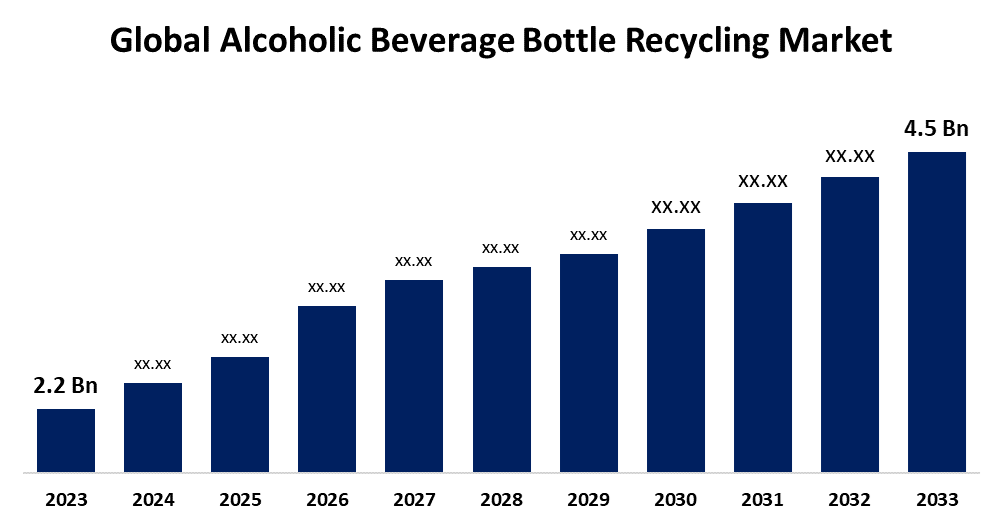Global Alcoholic Beverage Bottle Recycling Market Size, Share, and COVID-19 Impact Analysis, By Type (Colored Glass and Plain Glass), By Application (Bottle-to-Bottle Recycling, Fiberglass Production, Aggregates for Construction, and Others), and By Region (North America, Europe, Asia-Pacific, Latin America, Middle East, and Africa), Analysis and Forecast 2023 - 2033
Industry: Chemicals & MaterialsGlobal Alcoholic Beverage Bottle Recycling Market Insights Forecasts to 2033
- The Global Alcoholic Beverage Bottle Recycling Market Size was Valued at USD 2.2 Billion in 2023
- The Market Size is Growing at a CAGR of 7.42% from 2023 to 2033
- The Worldwide Alcoholic Beverage Bottle Recycling Size is Expected to Reach USD 4.5 Billion by 2033
- North America is Expected to Grow the fastest during the forecast period.

Get more details on this report -
The Global Alcoholic Beverage Bottle Recycling Market Size is Anticipated to Exceed USD 4.5 Billion by 2033, Growing at a CAGR of 7.42% from 2023 to 2033.
Market Overview:
Bottle recycling is the method of recycling glass bottles for usable products. The rising focus on heightened investment in beverage container processing and increased practices of sustainable packaging is expected to increase the revenue of the alcoholic beverage bottle recycling market. The increasing environmental awareness among customers and rigorous government regulations concerning waste management are expected to drive the growth of the alcoholic beverage bottle recycling market.
The beverage industry's dedication to corporate social responsibility and sustainability encourages investment in bottle recycling projects. Recycling process technological developments, such as boosted sorting and processing technologies, increase the efficiency and quality of recycled glass, hence increasing the market. These causes, together with the growing consumer desire for eco-friendly products and the increased collaboration between beverage firms and recycling groups, support the expansion of the alcoholic beverage bottle recycling market. Bottle recycling has significantly contributed to the cost-managing initiative of the beverage industry and businesses will continue to reuse bottles. Therefore, it will increase the market growth.
Report Coverage:
This research report categorizes the market for the global alcoholic beverage bottle recycling market based on various segments and regions forecasts revenue growth and analyses trends in each submarket. The report analyses the key growth drivers, opportunities, and challenges influencing the global alcoholic beverage bottle recycling market. Recent market developments and competitive strategies such as expansion, product launch, and development, partnership, merger, and acquisition have been included to draw the competitive landscape in the market. The report strategically identifies and profiles the key market players and analyses their core competencies in each sub-segment of the global alcoholic beverage bottle recycling market.
Global Alcoholic Beverage Bottle Recycling Market Report Coverage
| Report Coverage | Details |
|---|---|
| Base Year: | 2023 |
| Market Size in 2023: | USD 2.2 Billion |
| Forecast Period: | 2023 - 2033 |
| Forecast Period CAGR 2023 - 2033 : | 7.42% |
| 2033 Value Projection: | USD 4.5 Billion |
| Historical Data for: | 2019-2022 |
| No. of Pages: | 233 |
| Tables, Charts & Figures: | 111 |
| Segments covered: | By Type, By Application, By Region and COVID-19 Impact Analysis. |
| Companies covered:: | Sisecam, BottleCycler, Johann Schirmbeck GmbH, Koppelberg & Migl GmbH, AGC Inc, Visy, Vetropack Holding Ltd., Sibelco, ArdaghGroup, Reclam Group, Owens-Illinois, Ngwenya Glass, Vetropack Group, Nampak, Pace Glass, Saverglass, GlassLand, Kimberley, Gallo Glass Company, Consol Glass, and other key vendors. |
| Pitfalls & Challenges: | COVID-19 Empact, Challenge, Future, Growth, & Analysis |
Get more details on this report -
Driving Factors:
The alcoholic beverage bottle recycling industry is being pushed by increased awareness of the environmental effects of glass waste and the desire to limit landfill use. Recycling alcoholic beverage bottles saves natural resources and considerably reduces the energy consumption and carbon emissions connected with glass manufacture. Furthermore, the growing demand for environmentally friendly packaging solutions in the beverage sector is driving the development of bottle recycling procedures.
Restraining Factors:
The logistical hurdles in collecting and contamination issues could pose a hindrance to market expansion in the upcoming years.
Market Segmentation:
The global alcoholic beverage bottle recycling market share is classified into type and application.
- The colored glass segment has a significant revenue share over the forecast period.
Based on the type, the global alcoholic beverage bottle recycling market is categorized into colored glass and plain glass. Among these, the colored glass segment has a significant revenue share over the forecast period. Glass bottles are recycled by breaking them into small fragments called cullets, which are then cleaned, sorted, and melted. Small-scale businesses focusing on recycling and reaching a certain color bottle might employ mixed-color cullet, keeping more glass bottles out of landfills and decreasing energy costs involved with making glass.
- Bottle-to-bottle recycling segment has a significant share of the market during the forecast period.
Based on the application, the global alcoholic beverage bottle recycling market is categorized into bottle-to-bottle recycling, fiberglass production, aggregates for construction, and others. Among these, the bottle-to-bottle recycling segment has a significant share of the market during the forecast period. Bottle-to-bottle recycling is the technique of reusing old plastic bottles to make new ones. It is a practice that has gained popularity due to its favorable influence on the environment and economics. Major beverage producers have vowed to lessen their environmental impact and work toward a more sustainable future. The PET bottle has various qualities that make it an eco-friendly option. The PET bottle has strong barrier qualities due to its single-layer, mono-material construction making it more easily recyclable.
Regional Segment Analysis of the Global Alcoholic Beverage Bottle Recycling Market
- North America (U.S., Canada, Mexico)
- Europe (Germany, France, U.K., Italy, Spain, Rest of Europe)
- Asia-Pacific (China, Japan, India, Rest of APAC)
- South America (Brazil and the Rest of South America)
- The Middle East and Africa (UAE, South Africa, Rest of MEA)
Asia-Pacific is projected to hold the largest share of the global alcoholic beverage bottle recycling market over the forecast period.

Get more details on this report -
Asia-Pacific is projected to hold the largest share of the global alcoholic beverage bottle recycling market over the forecast period. Asia Pacific controlled the alcoholic beverage bottle recycling market, owing to increased sales of alcoholic drinks. This increase in demand is driving market dynamics in the area. Sustainable packaging is another important component driving regional market growth. Customers are becoming more conscious of the environmental consequences of their purchase decisions, and they favor businesses that value sustainability. Beverage businesses are reacting by using recycled glass bottles, which appeal to environmentally concerned consumers while also aligning with corporate sustainability goals. Recycled glass bottles have the same quality and look as new bottles but with a substantially lower environmental effect.
North America region is also expected to fastest CAGR growth during the forecast period. In North America, the huge amount of glass in landfills is increasing the market share for alcoholic beverage bottle recycling. According to the United States Environmental Protection Agency (EPA), roughly 7.6 million tons of glass are dumped in landfills around the country each year. This considerable waste emphasizes the need for efficient recycling systems to reduce environmental impact and foster growth in the recycling industry.
Competitive Analysis:
The report offers the appropriate analysis of the key organizations/companies involved within the global alcoholic beverage bottle recycling market along with a comparative evaluation primarily based on their product offering, business overviews, geographic presence, enterprise strategies, segment market share, and SWOT analysis. The report also provides an elaborative analysis focusing on the current news and developments of the companies, which includes product development, innovations, joint ventures, partnerships, mergers & acquisitions, strategic alliances, and others. This allows for the evaluation of the overall competition within the market.
List of Key Companies:
- Sisecam
- BottleCycler
- Johann Schirmbeck GmbH
- Koppelberg & Migl GmbH
- AGC Inc
- Visy
- Vetropack Holding Ltd.
- Sibelco
- ArdaghGroup
- Reclam Group
- Owens-Illinois
- Ngwenya Glass
- Vetropack Group
- Nampak
- Pace Glass
- Saverglass
- GlassLand
- Kimberley
- Gallo Glass Company
- Consol Glass
- Others
Key Market Developments:
- In January 2024, California regulators broadened the types of beverage containers eligible for redemption credit beginning in 2024. The Legislature has set about $285 million for recycling reform. This includes financing for CalRecycle's program modernization initiatives. This part of recycling modernization includes market development measures such as subsidies for recycled glass and funding for local programs aimed at collecting additional containers.
Key Target Audience
- Market Players
- Investors
- End-users
- Government Authorities
- Consulting And Research Firm
- Venture capitalists
- Value-Added Resellers (VARs)
Market Segment
This study forecasts revenue at global, regional, and country levels from 2020 to 2033. Spherical Insights has segmented the global alcoholic beverage bottle recycling market based on the below-mentioned segments:
Global Alcoholic Beverage Bottle Recycling Market, By Type
- Colored Glass
- Plain Glass
Global Alcoholic Beverage Bottle Recycling Market, By Application
- Bottle-to-Bottle Recycling
- Fiberglass Production
- Aggregates for Construction
- Others
Global Alcoholic Beverage Bottle Recycling Market, By Regional
- North America
- US
- Canada
- Mexico
- Europe
- Germany
- Uk
- France
- Italy
- Spain
- Russia
- Rest of Europe
- Asia Pacific
- China
- Japan
- India
- South Korea
- Australia
- Rest of Asia Pacific
- South America
- Brazil
- Argentina
- Rest of South America
- Middle East & Africa
- UAE
- Saudi Arabia
- Qatar
- South Africa
- Rest of the Middle East & Africa
Frequently Asked Questions (FAQ)
-
1. What is the CAGR of the global alcoholic beverage bottle recycling market over the forecast period?The global alcoholic beverage bottle recycling market size is expected to grow from USD 2.2 Billion in 2023 to USD 4.5 Billion by 2033, at a CAGR of 7.42 % during the forecast period 2023-2033.
-
2. Which region is expected to hold the highest share in the global alcoholic beverage bottle recycling market?Asia-Pacific is projected to hold the largest share of the global alcoholic beverage bottle recycling market over the forecast period.
-
3. Who are the top key players in the alcoholic beverage bottle recycling market?Sisecam, BottleCycler, Johann Schirmbeck GmbH, Koppelberg & Migl GmbH, AGC Inc, Visy, Vetropack Holding Ltd, Sibelco, ArdaghGroup, Reclam Group, Owens-Illinois, Ngwenya Glass, Vetropack Group, Nampak, Pace Glass, Saverglass, GlassLand, Kimberley, Gallo Glass Company, Consol Glass, and Others.
Need help to buy this report?